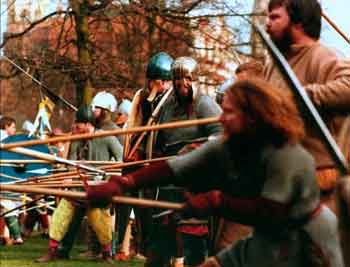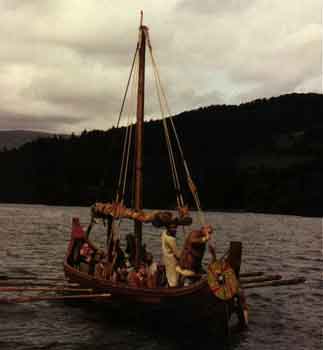
The country was divided into units (hafna) each assessed at one full mark of gold, all of which were committed to manning and arming a ship. The crew would have varied from 40 - 60, and in addition to a spear, iron cap (helmet) and shield for each member, one mail shirt per ship, and one bow and arrows per 6 benches were required. These figures varied slightly in different countries and times but provide a good average guide, although if each crew had say three times the number of bows and arrows to mail shirts, then carnage was almost always guaranteed. So either there was an expectation that more mail was owned by the lithsmen on board or this figure of one shirt is erroneous. A similar system probably continued to be used in the Danelaw where there was a large number of small land-holding bondi - a thing of the past in the manorialy based Saxon England. Like the Saxon fyrd the Anglo-Danish here may have had a system of rotation for service to reduce the burden on estates, although like the fyrd it may have contained many semi-professional warriors.
The eleventh century saw a gradual shift to a more permanent professional force commencing with the assaults of Swein and Cnut upon England. In 1012 forty-five ships detached themselves from Swein's fleet and made a bargain with Æthelred to 'keep the country against its enemies' provided the crew were fed and clothed. Later, under Cnut, a standing force of 40 ships was maintained after the disbanding of the here or army.
Its crews were professionals, lithsmen, and were clearly distinguished from the ships manned by the levies. The men received eight full marks a year per oar. Only under Edward, free of Danish dominance, did this system decline and the still loyal Danish ships left England with their gains.
 |
Similarly, Cnut instituted the thingemannalith or tinglith, better known by the English term huscarl. In many ways it formalised the earlier system of the hirð. Unlike the earlier band this one was not supported by the king alone, but by taxes and fees, usually from the towns and burhs where there was much wealth but little land, hence less obligation for fyrd service. In at least two cases there are references to butsecarles being paid by a burh whose citizens are not taking part in the king's host. These men appear to be mercenaries given garrison duties to protect towns in potential danger who had already provided men for the fyrd.
There was very little formal structure by way of military rank in Viking armies. As a rule the term dreng is applied to a young warrior, and ðegn to a more mature member of a boat's crew. The only two specifically military posts referred to at the time were the merkismathr, the standard bearer (an honoured position since many Viking standards were said to have magical properties), and the stallari or marshal - the king's deputy in the field.
In the eleventh century the Norse kings probably had an immediate retinue of about ninety men, excluding menial servants and hangers on. These were divided into the hirðmenn (household men or hearthmen, i.e.; men who were privileged to be sharing his hearth) and a lower class called gestir literally guests, whose pay was half that of the hirðmenn. The gestir had their own leader, assembly and quarters. They acted as a kind of police force, doing errands for the king, executing his justice and collecting his taxes. They were not a popular group, and a later explanation of their name is that they were 'unwelcome guests' in many a house!
The hirðmenn were hand-picked and well rewarded. To be chosen was a great honour and meant acceptance not only by the other members, but by the king. A hirðman paid homage to the king and swore loyalty to him and the other hirðmenn. In Norway the hirðmenn maintained a hospice for their old and infirm members (a sort of early 'benevolent fund'!). These men were knit together by the personal bond they each had with their king or chieftain.
'The king and other leading men who had a hirð should show their men favour and goodwill and give them their proper pay. In return men should give their lord loyalty and service and be prepared to do all his commands.'
Related articles on this subject: